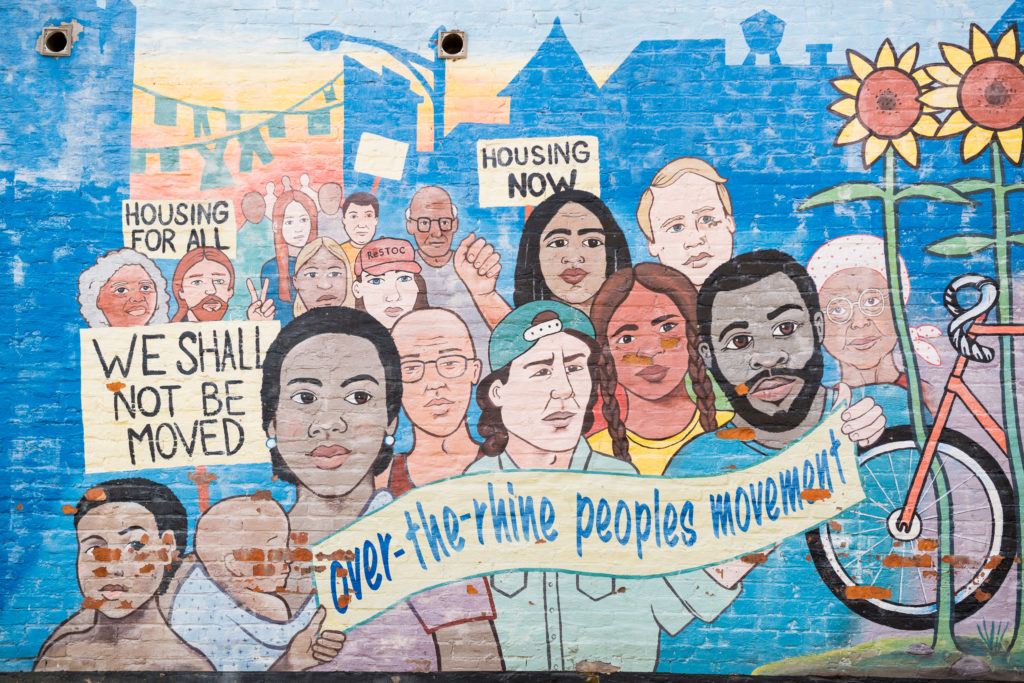
People are able to thrive when they have safe, stable places to live. That means we feel secure, our homes and neighborhoods are free from hazards, and our communities provide us what we need.
Housing is the biggest expense in most family budgets, making housing affordability a significant factor in financial well-being. Homeownership has long been at the center of the American Dream, offering a way to build family wealth and stable, diverse communities.

What You Need to Know
These key issues are essential to understanding how we can support thriving people and places.
Humane Housing: Consistent, Safe, & Affordable Housing
- People already struggling to make ends meet before the crisis now face a choice between paying the rent and buying food, medicine, or other necessities.
- The crisis has impacted multiple sectors, from housing and food security, to employment and local businesses, to mental health and city budgets. The challenges compound each other—and effective solutions are similarly integrated.
- We must leverage and align funding so that each dollar has multiple impacts.
- Over 35 states, 150 municipalities, and the federal government have taken some action to limit evictions during this crisis.

Historical Context
SYSTEMIC DISCRIMINATION IN HOUSING POLICY has created persistent inequities in homeownership and wealth, in addition to creating entrenched racial segregation. From the 1930s through the late 1960s, the federal government’s practice of “redlining” limited or denied mortgage insurance in neighborhoods with high rates of Black households and other households of color. The legacy of this discrimination continues today, in exclusionary zoning practices that artificially constrain supply and keep house prices and rents beyond the reach of many.
As a result, access to homeownership, better schools, healthy food options, and other positive externalities are less available to households of color than to White households. This is why Black households today have lower homeownership rates than all other racial and ethnic groups and are three times as likely as White people to live in outdated, crowded, or substandard homes.
That’s the insidious nature of racism and anti-Blackness. … you don’t even realize you’re hurting white America, too.“
Michael McAfee, PolicyLink

Current Conditions
Housing insecurity creates chronic health disparities, exacerbating hypertension, diabetes, and other medical conditions that contribute to the alarmingly high COVID-19 death rates in Communities of Color. Poor housing conditions also directly increase families’ exposure to the virus because they make it difficult to practice social distancing and to take required COVID-19 precautions.

“For place-based recovery, there are universal factors that determine whether recovery is equitable. In practice, equity is not a fixed destination or singular dimension – it is dependent on where a community is starting from. It is directional and needs to be defined by the priorities and self-determination of the community, tied to its specific needs and opportunities.”
Enterprise Community Partners

Pivotal Moves
A Selection of Ideas for Changing Course
PIVOTAL MOVES are decisive actions that could begin now and change the course of community life relatively quickly.
SUPPORT HOUSING STABILITY FOR THOSE AFFECTED BY COVID-19
Prohibit unaffordable balloon payments for ending forbearance periods and other postponements of payments.
All housing expenses associated with homeownership should be frozen for families facing income loss associated with the outbreak, without damaging their credit. This includes mortgage payments, taxes, homeowner and flood insurance, and utility bills.
Halt evictions and foreclosures. Provide emergency housing for everyone who doesn’t have a home, including people experiencing homelessness, being released from incarceration and detention, or facing domestic violence.
Ensure the right to counsel for tenants facing eviction despite local and federal laws.
To prevent a flood of evictions at the end of moratorium periods, implement a program of rent and mortgage forgiveness.
PROMOTE RESPONSIBLE LOCAL OWNERSHIP
We must protect nonprofits, owners of deed-restricted affordable rental units, and small landlords who are providing affordable housing to make sure they have operating support and can expand to meet the demand for affordable housing.
We should work to prevent large for-profit investors from swallowing up housing stock by designing policies that give preference to tenants, nonprofits, local governments, and small-scale local purchasers.
MAKE HOUSING AFFORDABLE
The cost of building affordable housing should be reduced by having state and local governments purchase and hold land with federal assistance. This can be coupled with local zoning that prohibits single family units and the establishment of universal housing codes.
Require mixed-income housing so that higher rent units subsidize lower rent units.
Triple government support for rental assistance (Section 8 vouchers).
Use Community Land Trusts and agreements with employers to prevent displacement.
Create renters’ insurance through payroll taxes, and create Rent Resilience Funds to cover rent for those who require assistance during economic downturns. Prevent housing instability in the first place by encouraging corporations to provide subsidized housing for low-income employees.
Standardize “mortgage reserve accounts” to build emergency savings to make mortgage payments in a crisis.